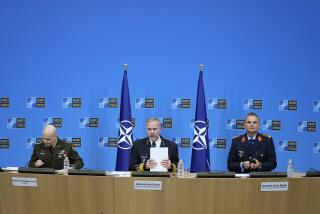Air Power Isn’t Enough : The Bosnian army needs arms, and Europe Needs Russia
- Share via
NATO announced Friday in Brussels that it will begin air strikes today against Bosnian Serb heavy weapons and other military targets within a 12-mile radius of the center of the besieged town of Gorazde unless the siege is immediately lifted. Comparable exclusion zones were announced for the four remaining “safe haven” towns. In Belgrade U.N. special envoy Yasushi Akashi said that the Serbs had agreed to the Gorazde cease-fire and the weapons withdrawal.
If the Bosnian Serbs keep this agreement, then the threat of NATO air engagement will have done for Gorazde what it did in February for Sarajevo. If the Serbs do not keep the agreement, then the war may suddenly and rapidly escalate. Two hundred NATO planes are positioned to reply. Ominously, the families of British and American diplomatic personnel have been ordered to leave Belgrade immediately.
The Clinton Administration maintains that the purpose of the new ultimatum is to bring the Bosnian Serbs back to the negotiating table. But the Serbs have never left the table. They have merely made a joke of it, and they will continue to do so until the balance of power changes.
For this to happen, NATO air power, strategically deployed, must be matched by the ground power of the Bosnian National Army. The Clinton Administration must continue to press for a lifting of the punitive, arguably illegal Bosnian arms embargo.
But even as it does so, the Administration must recognize that Russian President Boris N. Yeltsin’s summit proposal is not marginal but potentially central to a final settlement.
A summit conference has a certain meaning. It says--and rightly--that Bosnia is not a sideshow but a full-blown European crisis that will not be solved without a new, post-Cold War political consensus with arms to back it.
More to Read
Sign up for Essential California
The most important California stories and recommendations in your inbox every morning.
You may occasionally receive promotional content from the Los Angeles Times.













